Unlocking the Power of AI in Content
In today's fast-paced digital landscape, as a marketer or content creator, you are often looking for new ways to engage your audience and improve your strategies. One significant advancement in recent years is the integration of artificial intelligence (AI) into content enhancement. AI-powered content enhancement involves using AI technologies to analyze, curate, and create marketing materials that resonate effectively with target audiences.
AI offers various benefits that can positively impact your marketing efforts. For example, it enables you to make data-driven decisions, tailoring content to fit audience preferences and behaviors. Automation improves efficiency, allowing you more time to focus on creative aspects of your campaigns. Additionally, AI's ability to personalize content can significantly increase user engagement and retention.
Coca-Cola's AI-driven content creation platform is a notable example. It analyzes extensive consumer data to craft personalized marketing materials, resulting in increased efficiency in content production and higher engagement rates. Similarly, Netflix uses AI algorithms to analyze viewer behavior, leading to personalized recommendations that account for over 80% of the content viewed on its platform.
This infographic outlines various benefits of AI in business (Source: Neil Sahota)
Content Conversion Rates and AI Strategies
If you want to improve content conversion rates, AI can help. By applying AI strategies, you can analyze customer behavior and preferences, enabling you to create content tailored to your audience's needs.
Implementing AI-driven techniques can lead to significant results. For example, PepsiCo developed an AI marketing tool named Ada, which gauges audience reactions to creative ideas and speeds up content production. By personalizing user experiences through AI, brands have seen remarkable increases in conversion rates—some studies suggest an ROI of eight times with tailored marketing efforts.
Research shows that AI-powered A/B testing can enhance conversion rates by up to 40%. This illustrates the tangible benefits of leveraging AI for your content strategies. By integrating AI-driven systems, you can automate the testing process to identify the most effective content variations quickly and accurately.
 An illustrative case study image from Henkel showing insights into successful AI marketing strategies (Source: Henkel Case Study)
An illustrative case study image from Henkel showing insights into successful AI marketing strategies (Source: Henkel Case Study)
Automating A/B Testing
A/B testing involves comparing two versions of content to see which performs better. By incorporating AI, you can significantly enhance this process, making it more efficient and accurate.
AI tools automate A/B testing by quickly analyzing user interactions and engagement metrics. Machine learning algorithms can process this data and predict which version of your content will succeed, allowing you to implement changes with confidence.
The benefits of using AI for A/B testing are substantial. Studies indicate that AI-enabled testing can improve conversion rates by as much as 40%. Furthermore, AI can adjust campaigns in real-time based on user interactions, enabling dynamic testing that adapts to audience behavior.
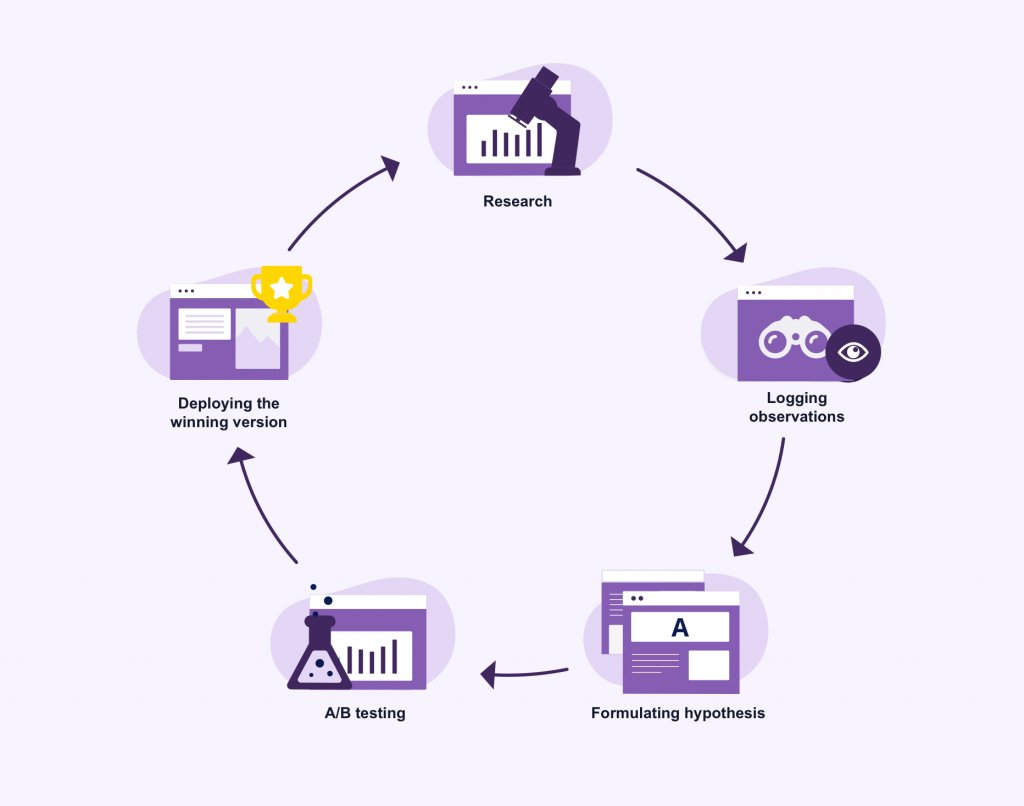 This visual diagram shows the steps involved in A/B testing with AI (Source: VWO)
This visual diagram shows the steps involved in A/B testing with AI (Source: VWO)
Personalizing Content with AI
Personalization is vital in the competitive digital landscape we face today. With AI, you can create content tailored to meet the unique preferences and needs of diverse audience segments. This not only enhances user engagement but also fosters a deeper connection with your brand.
AI-driven audience segmentation helps you analyze user data and behavioral patterns, leading to relevant and engaging messaging. For instance, Sephora deployed AI technology to enhance the online shopping experience, significantly boosting sales and reducing product returns.
However, as you personalize content through AI, it's crucial to address potential ethical considerations. Transparency regarding data collection and user privacy needs to be a priority. Ensuring that your AI practices respect user rights can build trust and loyalty among your audience.
A flowchart illustrating audience segmentation techniques using AI (Source: Medium)
The Ethical Side of AI in Marketing
As you adopt AI in your marketing strategies, it's important to consider ethical implications. Transparency and disclosure about AI usage are key factors; according to research from Sprout Social, 63% of consumers want to know when content is AI-generated.
Another crucial aspect is data privacy and security. Marketers need to ensure that they gather user consent and have robust protection measures in place when handling sensitive information. Additionally, mitigating bias in AI-generated content is paramount. AI systems often reflect societal biases found in their training data, which can lead to misrepresentation.
To maintain ethical standards, emphasize human oversight in your content creation processes and design AI systems that prioritize inclusivity. Addressing these challenges not only enhances your brand's reputation but also ensures your practices align with audience expectations.
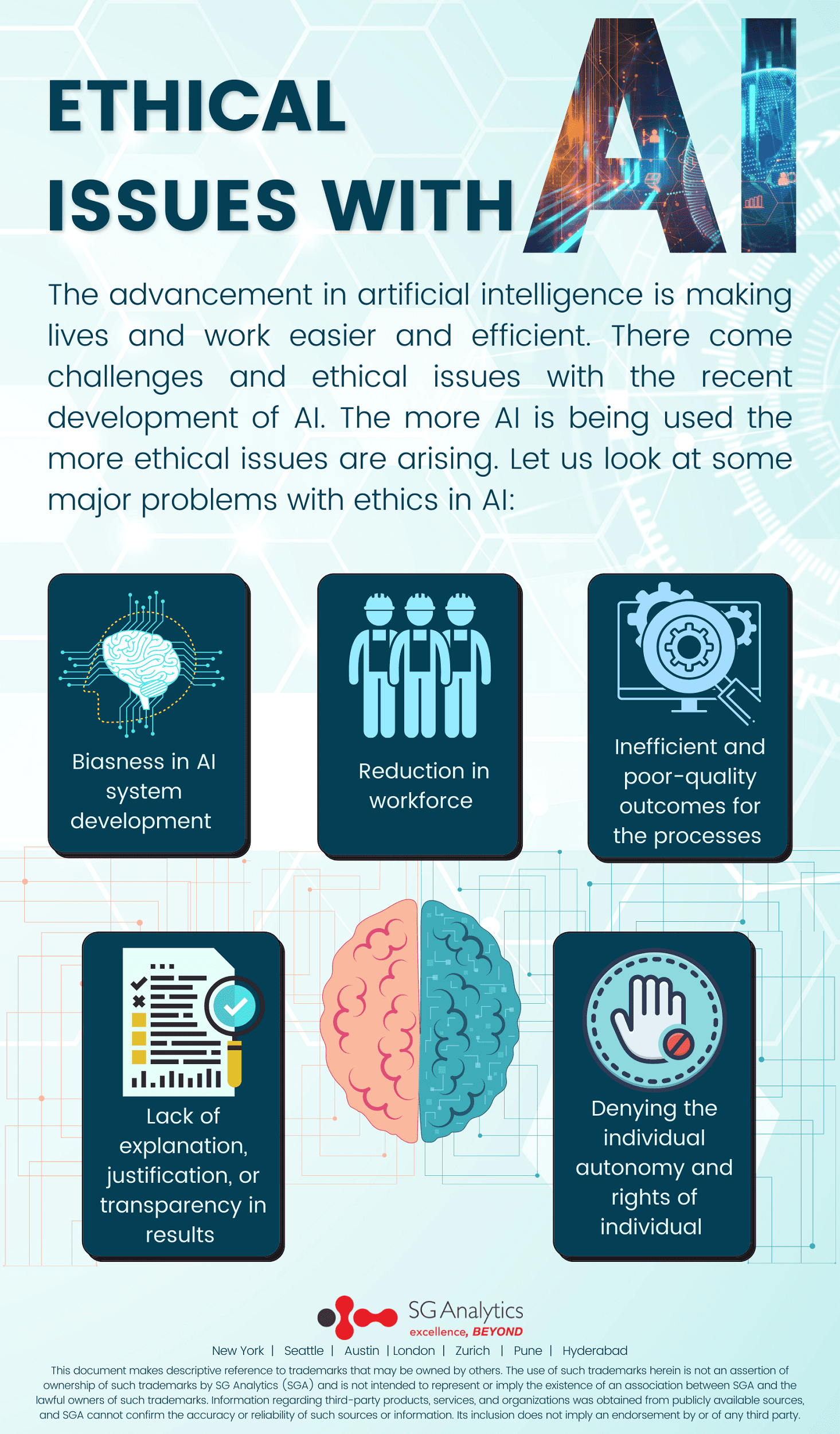 An infographic detailing the ethical considerations in using AI for marketing purposes (Source: SG Analytics)
An infographic detailing the ethical considerations in using AI for marketing purposes (Source: SG Analytics)
Integrating AI Tools into Your Content Workflow
While AI offers substantial benefits, integrating these tools into your existing workflows can present challenges. Marketers often face issues such as inconsistent user experiences, content redundancy, and limited customization abilities. For example, using a clunky AI tool can hinder effective content production and diminish your efficiency gains.
Additionally, marketers may encounter data overload, resulting in spending excessive time organizing data rather than creating content. It can also be challenging to maintain a consistent brand voice across different platforms.
To successfully integrate AI, consider choosing user-friendly solutions with intuitive interfaces. Regular updates to the technology can also keep it relevant. Implement effective feedback mechanisms to refine AI outputs. Using content governance tools ensures brand standards are upheld across all generated materials.
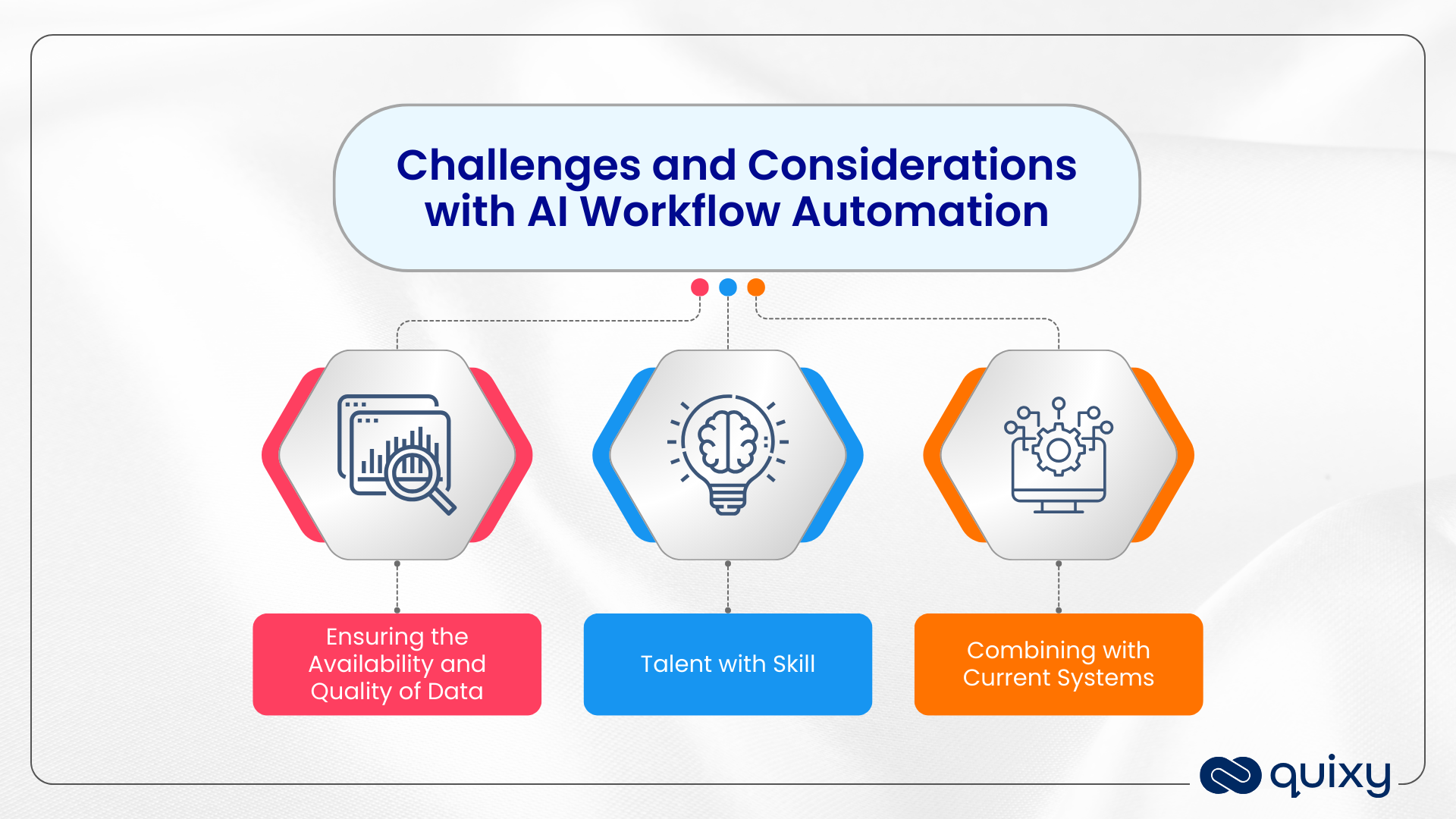 A visual representation of common challenges faced when implementing AI workflows (Source: Quixy)
A visual representation of common challenges faced when implementing AI workflows (Source: Quixy)
Measuring Success: Tracking ROI for AI Strategies
Tracking the return on investment (ROI) for AI-enhanced content is crucial for understanding the effectiveness of your strategies. Establishing key performance indicators (KPIs) will help you measure success accurately. Consider using a Content Quality Score to evaluate your content's engagement, readability, and consistency.
When calculating ROI, analyze the revenue generated from AI content against the costs associated with AI tools and production. Effective benchmarks will guide your efforts; for example, aim for a 20-30% improvement in conversion rates with AI-optimized content compared to non-AI content.
Jasper suggests employing a clear formula: ROI = (Revenue from AI Content - Cost of AI Tools and Production) / Cost of AI Tools and Production. By setting clear metrics and analyzing performance regularly, you'll gain insight into your AI strategies and their effectiveness.
 A chart comparing performance metrics before and after AI integration in content strategies (Source: ResearchGate)
A chart comparing performance metrics before and after AI integration in content strategies (Source: ResearchGate)
Tomorrow's Technologies: Emerging AI Trends
As you look to the future of content creation, emerging AI technologies promise to reshape the marketing landscape. Generative AI models are projected to automate content creation by generating multiple versions of emails, ad copy, and landing pages—enabling more dynamic marketing strategies.
Enhanced personalization through AI will facilitate real-time adjustments to content based on user preferences. Moreover, the shift towards AI-driven multivariate testing will allow marketers to conduct more complex analyses to determine which content combinations are most effective.
To stay ahead, invest in robust data collection and management systems, cultivate expertise in emerging technologies, and maintain an agile approach to your marketing strategies. By preparing for these advancements, you'll be able to leverage AI efficiently and effectively.
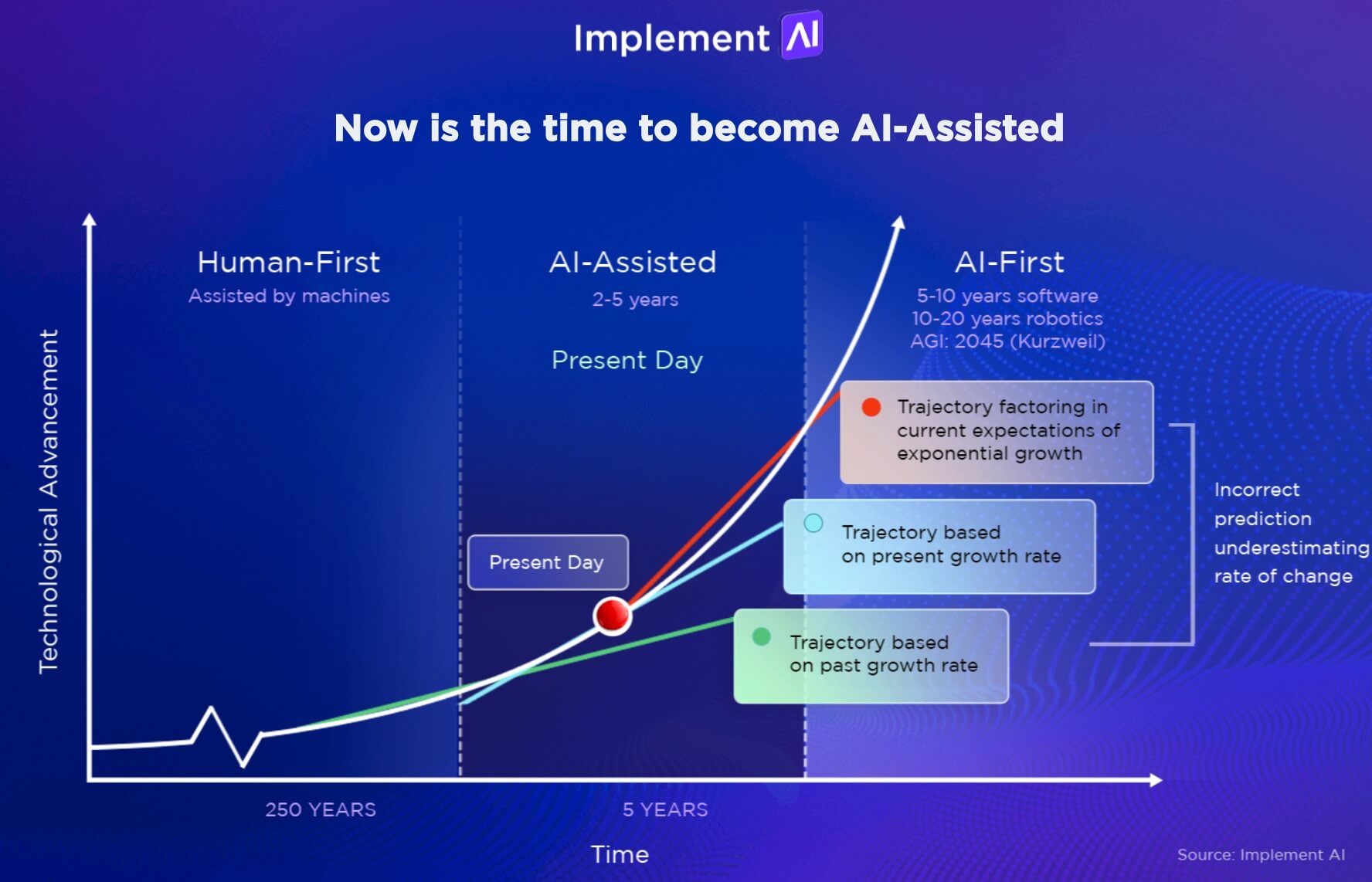 A graphic showcasing predictions and trends related to AI's impact on future marketing strategies (Source: Smart Insights)
A graphic showcasing predictions and trends related to AI's impact on future marketing strategies (Source: Smart Insights)
Getting Started with AI-Driven Strategies
To implement AI-driven strategies into your content workflows, start by defining your objectives clearly and identifying which AI tools will help you achieve these goals effectively. Choosing user-friendly AI systems with intuitive interfaces can facilitate seamless integration.
Next, develop a step-by-step guide to ensure a smooth deployment process. This includes establishing best practices for monitoring AI performance and iterating on strategies based on collected analytics. Staying informed about the latest AI trends and investing in team training will help maximize the effectiveness of your content enhancement efforts.
By applying a strategic framework for AI implementation, you can improve efficiency, enhance content quality, and achieve better results in your marketing efforts.
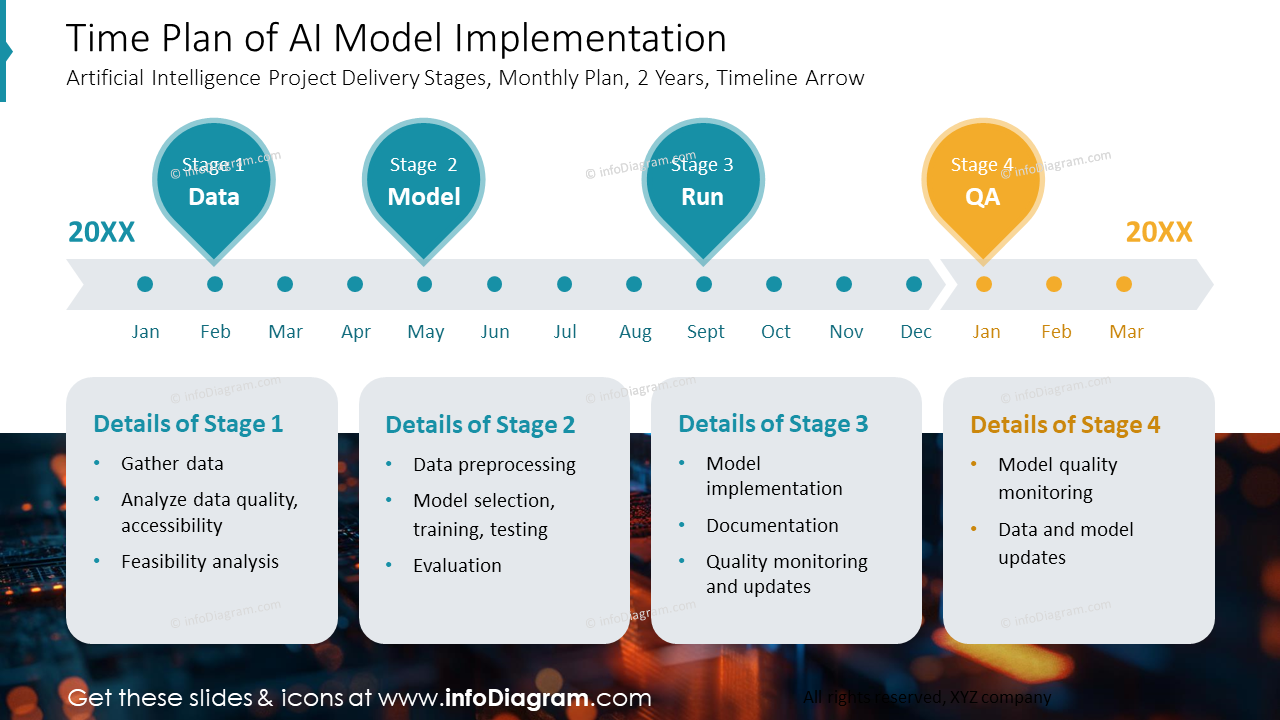 A timeline graphic illustrating the stages of implementing AI strategies in content creation (Source: InfoDiagram)
A timeline graphic illustrating the stages of implementing AI strategies in content creation (Source: InfoDiagram)
Conclusion
AI-powered content enhancement is not just a concept; it's a reality that can significantly optimize your marketing efforts. By leveraging AI tools effectively, you can enhance conversion rates, automate A/B testing, and personalize content for diverse audience segments.
As you navigate this evolving landscape, be sure to address the ethical considerations and challenges associated with AI integration. Utilizing strong metrics to measure ROI will equip you to make informed, data-driven decisions about your AI-supported strategies.
Investing in AI technologies today prepares you for tomorrow's marketing challenges, ensuring that your content remains relevant and engaging to your audience. Embrace the potential of AI and enhance your content strategies for greater impact.

Comentários (0)
Entrar para participar da discussão ou .